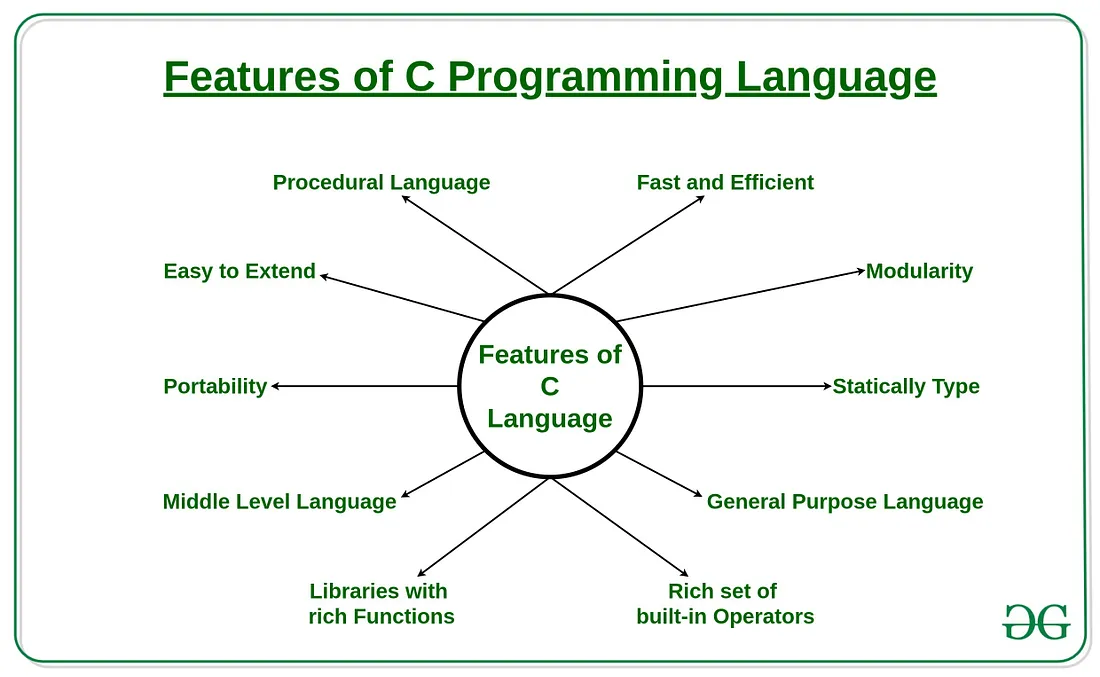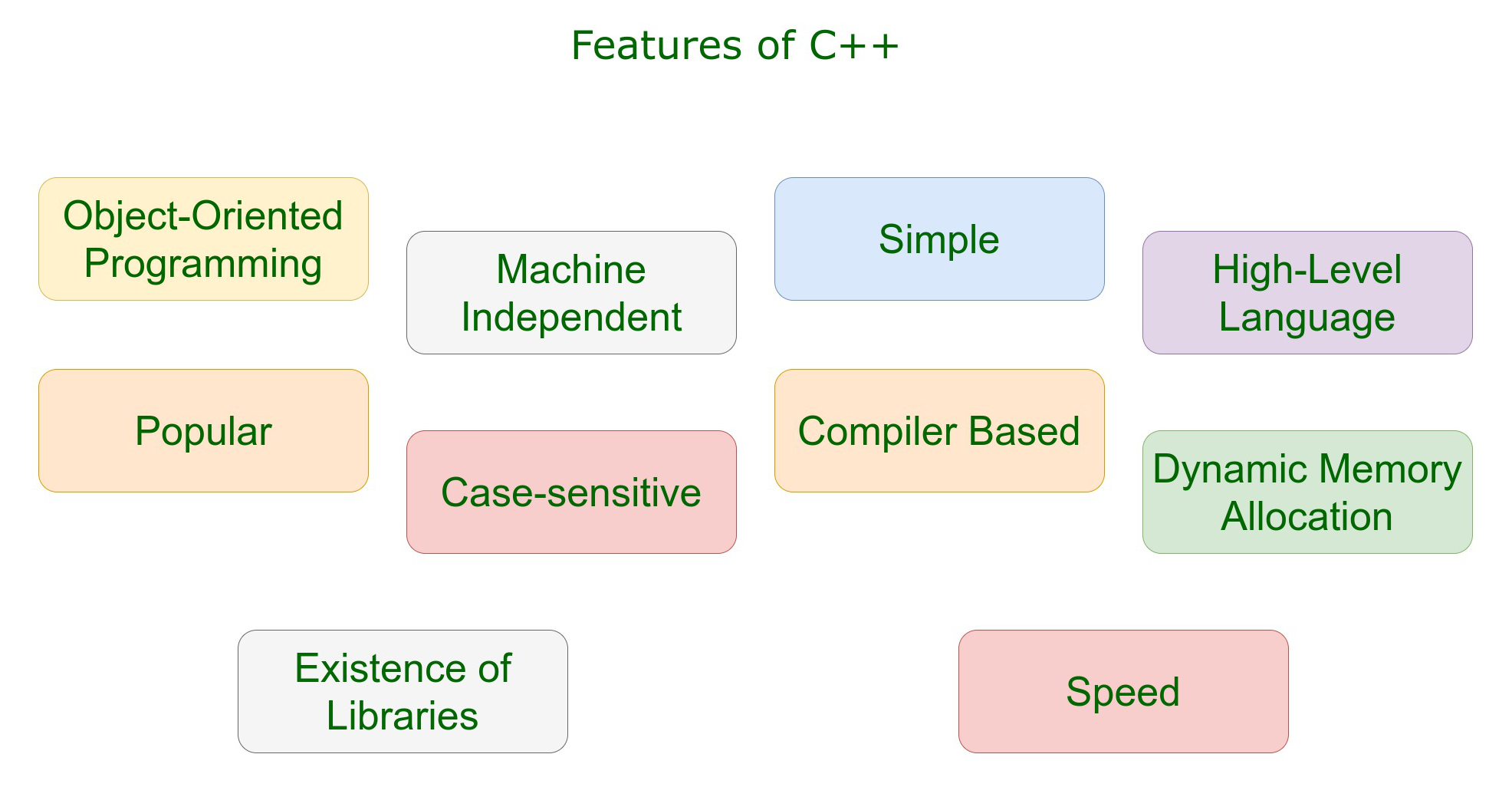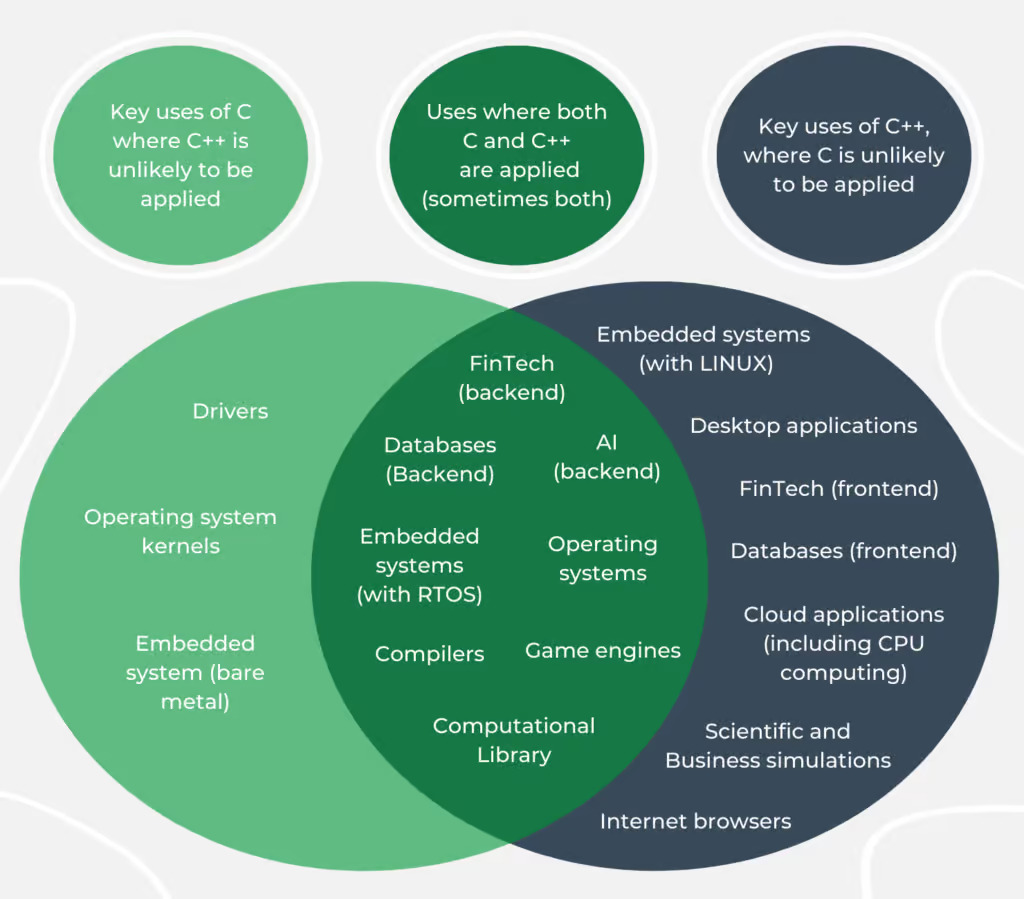C vs. C++: Key Differences Every Programmer Should Know
Table of Contents

Programming languages have revolutionised the way we interact with technology. Among the most influential of these are C and C++, two foundational languages that continue to shape the modern software landscape. Whether you’re a student, professional developer, or tech enthusiast, understanding the C and C++ difference is crucial to navigating your coding journey effectively.
The Significance of C and C++ Programming Languages:
In the world of programming, C and C++ stand as two foundational languages that have significantly influenced modern software development. The languages are the platform on which most of the modern software and apps are based.
Have you ever wondered what the C and C++ difference is? It’s a question that many people have, especially when they need to choose which one to learn. These languages are powerful tools for programming and developing software, but they each have their strengths and weaknesses.
In this blog post, we will explore what is C and C++ language, the C and C++ differences and similarities, shedding light on their unique features and applications, so that you can make an informed decision about which is best for your needs.
What is C Programming?
C programming is a procedural programming language. It was designed for compilation using a relatively simple compiler to provide low-level memory access. It offers language constructs that map efficiently to typical machine instructions, and require minimal run-time support. C was developed in the early 1970s by Dennis Ritchie.

*medium.com
What is C++ Programming?
C++ programming is an extension of the C programming language. It was developed by Bjarne Stroustrup while working on his PhD thesis at Bell Labs in the early 1980s. C++ adds object-oriented features to C, such as classes, inheritance, and polymorphism. These features make C++ a powerful tool for creating software systems.

*geeksforgeeks.org
The Difference Between C and C++ Programming
If you’re just starting in programming, you might wonder what the C and C++ difference is. Both are popular languages, but they have different features and uses. Here’s a rundown of the key C and C++ differences to help you decide which one to learn:
Programming Paradigm
C is a procedural language, while C++ is an object-oriented language. This means that in C, programs are written as a sequence of steps, while in C++, programs are written using objects that interact with each other.
Complexity
C is a relatively simple language, while C++ is more complex. This means that it’s generally easier to learn and use C than to learn and use C++.
Object-Oriented Features
C lacks support for object-oriented features such as classes, inheritance, and polymorphism. While C++ fully supports OOP concepts, facilitating code reusability and modularity.
Memory Management
C relies on manual memory management using functions like malloc() and free(). C++ offers both manual and automatic memory management, including constructors, destructors, and the new and delete operators.
Application
C is designed for systems programming, while C++ is designed for general-purpose programming. This means that C is typically used for developing operating systems or applications that run on low-level hardware. At the same time, C++ is more suited for developing high-level applications like games or business software.
Data Encapsulation
C does not support data encapsulation, leading to potential data exposure. C++ encourages data encapsulation through classes, promoting data hiding and security.
Function Overloading
C does not support function overloading; each function must have a unique name. Whereas C++ supports function overloading, allowing multiple functions with the same name but different parameters.
Standard Input and Output
C utilises functions like printf() and scanf() for input and output operations. C++ employs stream-based input and output using cin and cout.
Exception Handling
C lacks built-in support for exception handling; error handling is typically managed through return codes. In contrast, C++ provides robust exception handling using try, catch, and throw keywords.
Program Validity
C++ is a superset of C, which means that any valid C program is also a valid C++ program. However, C++ introduces many new features not present in C, such as classes, objects, inheritance, and polymorphism. As a result, programs written in C++ can be much more complex than programs written in C.
Namespace Feature
C does not support namespaces, which can lead to name conflicts in large projects. C++ introduces namespaces to avoid name collisions and organise code effectively.
Inline Functions
C does not support inline functions; function calls involve overhead. Contrary to this, C++ supports inline functions, reducing function call overhead and improving performance.
So which one should you learn? If you’re just starting out, we recommend learning C first. It’s simpler than C++ and will give you a good foundation in programming concepts. Once you’ve learned the basics of C coding, you can move on to learning C++ if you’re interested in doing so.
Summary: C and C++ Difference at a Glance
Here’s a quick summary of the c vs. c++ showdown:
| Category | C | C++ |
|---|---|---|
| Programming Paradigm | Procedural | Procedural + OOP |
| Application Domain | Embedded, OS | Games, Simulations, Large Systems |
| Code Reusability | Limited | High (via classes) |
| Performance | Fast | Fast with abstraction |
| Popularity | Foundational | Enterprise-level systems |
Similarities Between C and C++
Despite the C and C++ difference, the two languages share several similarities:
- Syntax: Both languages have similar syntax structures, making it easier for programmers to transition between them.
- Compilation: C and C++ use similar compilation processes, converting source code into machine code.
- Performance: Both offer high-performance capabilities suitable for system-level programming.
- Pointers: Both languages support pointer arithmetic, providing direct memory access and manipulation.
Pros and Cons of each language
When it comes to learning a programming language, there are always pros and cons to weigh up. Here are some pros and cons of C programming and C++ programming:
C Pros:
-C is a relatively simple language that is easy to learn for beginners.
-It is a structured language, which means code can be easily read and understood.
-C compilers are widely available and can be run on any platform.
-It has been around for a long time, so a wealth of online resources and support is available.
C Cons:
-Once written C code can be difficult to maintain or change.
-It is not an object-oriented language, so certain features (such as inheritance) are not supported.
C++ Pros:
-It is an object-oriented language, making it easier to write large programs made up of many smaller units of code (known as objects). This makes your code more reusable and scalable.
-As C++ was designed to be an extension of C, it shares many of the same advantages – including being quick to learn, easy to read and widely available on different platforms.
C++ Cons:
-Due to its flexibility and power, C++ can be more complex than C – particularly for beginners.
-Object-oriented programming can also make your cordless portable as it ties you closer to the platform you are working on.
Use Cases and Applications
The choice between C and C++ often depends on the specific requirements of a project. Understanding the C and C++ difference helps in making informed decisions.
When to Use C
- System Programming: Ideal for developing operating systems and embedded systems due to its low-level capabilities.
- Hardware Drivers: Suitable for writing drivers that interact directly with hardware components.
- Real-Time Systems: Preferred in environments where performance and predictability are critical.
When to Use C++
- Application Development: Widely used in developing desktop applications, games, and real-time simulations.
- Large-Scale Projects: Beneficial for projects requiring modularity and code reusability through OOP.
- Performance-Critical Applications: Suitable for applications that demand high performance with the added advantage of OOP features.

*solwit.com
Comparisons with Modern Languages (Java, Python)
C and C++ laid the foundation for many modern languages. Understanding c vs. c++ helps contextualise their relevance today.
C/C++ vs. Java
- Java is platform-independent and uses a virtual machine, while C/C++ offer greater control over hardware.
- Java handles memory automatically with garbage collection, while C/C++ requires manual memory management.
- C++ vs. Java is often a discussion of performance vs. convenience.
C/C++ vs. Python
- Python is dynamically typed and beginner-friendly.
- C/C++ are statically typed, compiled, and perform faster.
- Python excels in rapid development and AI/ML, whereas C++ is better for performance-critical applications.
Despite modern alternatives, knowing the C and C++ difference remains essential for understanding the evolution and core mechanics of programming.
Career and Industry Relevance
Why should professionals still care about the C and C++ difference today?
1. System-Level Programming
C and C++ are the backbone of operating systems (like Windows, UNIX) and performance-intensive applications.
2. Gaming & Simulation
AAA game studios use C++ for its performance and scalability, with companies like Ubisoft and Epic Games hiring C++ developers.
3. Finance & Trading
High-frequency trading platforms often run on C++ to achieve ultra-low latency.
4. AI, Robotics, and Embedded Systems
C is dominant in embedded systems, while C++ is increasingly used in robotics and autonomous systems for AI integration.
5. Career Options
- Embedded Software Engineer (C)
- Game Developer (C++)
- Systems Architect (C++)
- Quant Developer (C++)
- IoT Developer (C)
So, whether you’re writing firmware or building a financial simulation engine, the C and C++ difference is not just academic—it’s strategic.
Where can you learn C and C++ languages?
Once you’ve a basic understanding of the languages, you can enjoy diving deep into them with a professional BCA programme. Jaro Education is an online higher education platform that offers some of the best online BCA programmes in the country.
Manipal University Jaipur is one of the universities with Jaro Education that offers online BCA courses. A BCA programme will cover programming languages, computer fundamentals, cloud structure and statistics.
Manipal University Jaipur online courses are an excellent choice for any student who wants to excel at computer applications and boost their career.
The Online BCA Programme by Manipal University, Jaipur, is one of the best BCA courses in India. It is a 3-year long programme that focuses on various programming languages, cloud infrastructure, big data and machine learning. This Manipal University Jaipur online course is a perfect blend of live and recorded classes so that one can learn at their own pace. For information regarding the eligibility criteria, visit Jaro Education web portal today.
Open doors to the world of software development with C and C++ languages
The C and C++ difference isn’t just about syntax—it’s about design philosophy, application scope, and long-term relevance. Whether you’re debugging a microcontroller or designing the next blockbuster game, knowing what c and c++ language is gives you a robust edge. By learning both, you don’t just learn to program—you learn to think like a programmer.
C programming and C++ programming are two distinct, yet related languages. Although each language has distinct uses, they may also be employed together to produce very useful results. For developers wishing to choose the correct language for their projects, knowing the C and C++ difference is vital.
Although C offers simplicity as well as efficiency for low-level programming, C++ offers robust object-oriented functions more appropriate for sophisticated applications. Understanding the advantages and disadvantages of each language enables developers to make wise choices consistent with their career objectives and project needs.
Conclusion
Both C and C++ still have critical applications in the shifting programming scene. If you are delving into system programming or creating high-performance applications, a good understanding of these languages and their distinctions will without a doubt improve your programming skill. This can happen with a dedicated, professional BCA course.
Online higher education platforms such as Jaro Education offer a variety of different options to study BCA. Check out the online BCA Programme by Manipal University, Jaipur, available on Jaro Education now.
We hope this article has helped you understand the core C and C++ differences and how each can benefit your development process. So go ahead and start coding with either language today!
Frequently Asked Questions
What is the main difference between C and C++ programming languages?
While procedural programming is the primary functionality for C, C++ allows both procedural and object-oriented programming. This makes C++ more versatile for developing complex applications.
Why is it important to know the difference between C and C++ languages?
The understanding of the C and C++ difference is paramount, as it assists program developers in making the right selection according to the project’s requirements, especially in the field of system programming, game development, or embedded systems.
What programming language is best for beginners: C or C++?
Usually, C is the language that is first to be learned by beginners to get the basics of programming. Nevertheless, C++ is also a good beginning language and offers functions like classes and objects that are capable of being used for the creation of modern software.
How relevant are C and C++ in today's tech industry?
Despite the rise of languages like Python and Java, C and C++ remain relevant in industries like operating systems, embedded programming, game engines, and high-performance applications. Being an expert in these languages creates a bright future in serious technical fields.













![UI UX design What’s the Difference [2025 Update]](https://jaro-website.s3.ap-south-1.amazonaws.com/2025/03/UI-UX-design-Whats-the-Difference-2025-Update.webp)



